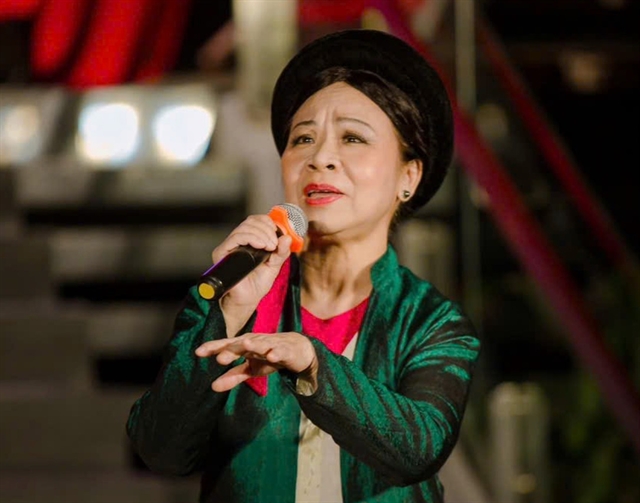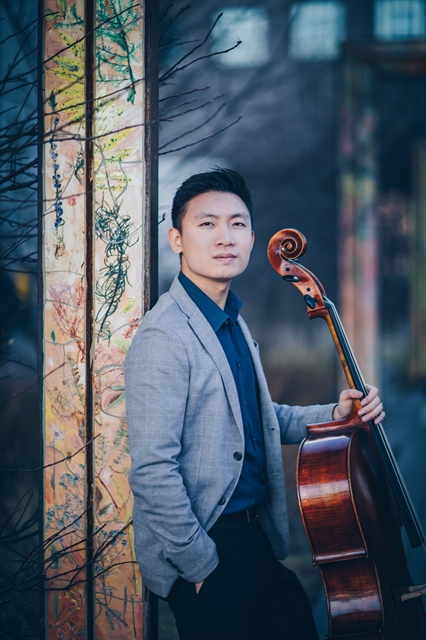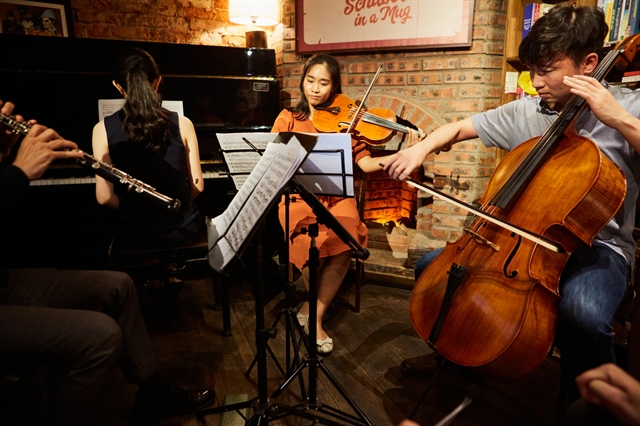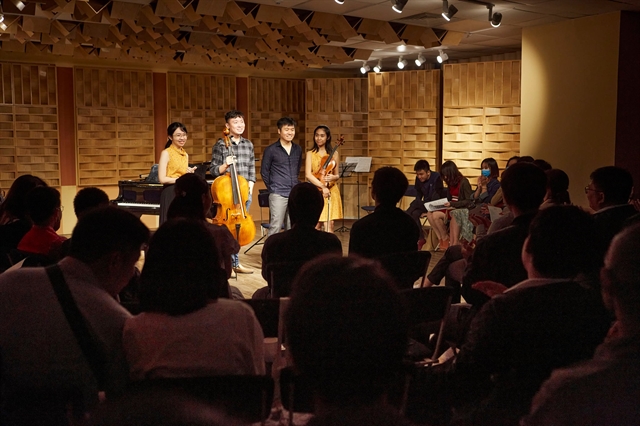 Inner Sanctum
Inner Sanctum

Alongside teaching chamber music and lecturing master classes, 31-year-old cellist Phan Đỗ Phúc has initiated “Schubert in a Mug” – a music project featuring concerts with the aim to bring classical performers and audiences closer together and still thrives amid the COVID-19 pandemic.
Returning to Việt Nam last year after more than 10 years studying and working in New York – one of the most bustling cultural hubs in the world – cellist Phan Đỗ Phúc has searched for ways to maintain his talent as a musician. Alongside teaching chamber music and lecturing master classes, the 31-year-old artist has initiated “Schubert in a Mug” – a music project featuring concerts with the aim to bring classical performers and audiences closer together. The artist speaks to Thúy Hằng about his decision to return home.

|
| Phan Đỗ Phúc |
Inner Sanctum: You decided to come back to Việt Nam after spending more than 10 years studying and working in New York. Was that a difficult decision?
Well, it was not an easy and obvious decision for both my wife Hsin-Chiao and I. Both of us have already established our lives in New York and we were quite comfortable, so to leave all of that behind was not such a simple consideration, as you can imagine. But eventually, after considering many factors, involving ourselves, our families and other things, we decided it was worth a try to come back to Việt Nam. After almost more than a year here (since February 2020), I can say I’m happy to have made that decision. Besides the fact that it’s good to be home and be close to family, I could feel tremendous untapped potential for classical music in Hà Nội and have been thrilled to help to contribute to its growth.
Inner Sanctum: Did you face any difficulties in returning to your home country? What is the biggest difference between the music scene in the US and Việt Nam?
I think the biggest challenge for me personally has been finding ways to maintain my studying and practising to improve myself as a musician. New York was basically the cultural centre, and I absolutely loved being surrounded and pressured by countless world-class musicians, many of them at my age or younger. One constantly has to push oneself to be better, to stay relevant in the scene, so I would say there was a lot of outside pressure which I thrived on. In comparison, Hà Nội has a rather young classical music tradition, relatively speaking, so naturally you don’t have such a huge crowd of die-hard professionals and enthusiasts who constantly threaten to take your place. The challenge then becomes creating the inner momentum and pressure to keep pushing myself to the standard that I have grown accustomed to during the time I lived abroad.
Another aspect is the matter of musical taste. While in New York, I felt a distinct sense that the public taste for classical music (or other musical genres and other art forms, for that matter) has been seasoned and refined over years and years, as the result of exposure to the absolutely best people in the field. On the other hand, here in Hà Nội, I think we are still in the process of searching and refining our taste, of finding what really resonates. And I personally find it quite exciting to observe how the taste is being shaped, and (hopefully) to positively contribute to that.

|
| Phan Đỗ Phúc (right) seen together with other musicians during their SiaM Vol. 7: Wolfie! on April 22 concert. Photo courtesy of SiaM |
Inner Sanctum: Have you been lecturing since you came back?
Besides enjoying my time on stage, I find myself rather passionate about teaching, so I have been doing quite a lot, from private cello lessons, to chamber music coaching, to running cello sectionals and master classes. I have found teaching to help myself deepen my understanding of music and the craft of playing my instruments, since I feel I don’t truly understand something until I can verbalise it and explain it to someone else effectively. Also, it feels good to be able to pass on values that have been bestowed upon me from my mentors and teachers abroad. As Janos Starker – a legendary cellist and pedagogue – emphasised the importance of teaching as the act of “passing on the torch”, I’m hoping to do the same.
Inner Sanctum: Many classical musicians in Việt Nam can’t earn a living through music. Do you find this to be true?
That is a rather sad fact which I’m very well aware of, and it’s not something that only happens in Việt Nam but many other places, New York included. Being a musician is not the most profitable profession and in many cases, we have to do other things to feed our passion.
I consider myself tremendously lucky that I have not had to do that here in Hà Nội. Thanks to the relatively low living expense here in Việt Nam, I feel a simple life is not too difficult to maintain; three meals a day and an occasional nice coffee outside here and there; I’m a happy man! But that’s probably because my wife and I have not had kids yet. I have a feeling once a kid enters the picture, things will be very different.
Inner Sanctum: As classical music isn’t that popular among most Vietnamese people, what do you do to improve this?
Classical music, similar to other forms of fine arts, takes time, patience and a bit of effort from the listeners to get accustomed to, and eventually to enjoy and appreciate. Unfortunately the modern lifestyle often does not allow an average person that bit of time and patience to sit down and enjoy the beauty that classical music offers; so the majority of people often choose other musical genres such as pop, for more immediate emotional reactions and thus, enjoyment. But I personally think what a person could get out of a session of deep and focused listening to classical music is really something else that touches him/her at a much deeper level and a lot more satisfying. The job for me and other classical performers would be to help guide listeners through a few sessions like that, and I believe many will be hooked. That’s part of the reasons why my team and I have started the project “Schubert in a Mug”. We hope to be helpful tour guides for audiences who are willing to join us for the journey.

|
| Listeners enjoy the SiaM Vol. 6: London Fog concert on March 30. Photo courtesy of SiaM |
Inner Sanctum: Can you tell us more about the project?
The idea of SiaM is to build a kind of bridge, to basically erase the distance between classical performers and audiences. As you know in a traditional concert hall setting, the two are in two different worlds, completely separated. Of course there’s beauty in the classic concert hall setting, and all of SiaM artists still regularly perform in such a context. But we hope to provide something different at SiaM, another perspective into classical music. Classical music could be very fancy, very majestic, but it could also be incredibly intimate. SiaM hopes to explore the beauty of warmth and intimacy in classical music at our concerts.
Since August 2020, we have hosted two concerts each month – every month with a different theme, from The First Viennese School, which feature the music of the Classical Era (around 1750-1832) to the most recent theme London Fog, which introduces rather modern, 20th century musical language from Britain. Almost every one of our concerts has been sold out and we got so much feedback from our dear audiences, both expressing their appreciation, as well as their constructive thoughts as to how SiaM can be even better. We are tremendously thankful.
In March, the project won the “Finest Project of the Year” by Hanoi Grapevine. SiaM is only eight months old, so it’s really encouraging for us to know that the project is being warmly received by our dear audiences, art lovers and critics.
Inner Sanctum: Financial issues always challenge any project. Does SiaM face the same problem?
Solving the financial problem is always tricky for start-up projects. From the beginning, we have decided that we needed to aim for a sustainable model, in which the amount earned from ticket sales has to be able to at least cover all expenses. And luckily we have been able to do just that.
Inner Sanctum: Has the current coronavirus pandemic affected the performing schedule of SiaM?
SiaM was born in August 2020, during the time that the COVID situation was also quite complicated, so we had to postpone our very first concert. But since then, we have been lucky that things have normalised enough for us to give monthly concerts. At the moment though, it seems we will have to postpone our SiaM Vol 8 concert again and we are looking into giving online concerts and other projects to utilise the social media platforms. It’s challenging for sure, but we are confident we will find ways to continue to thrive.
Inner Sanctum: Alongside SiaM, are you involved in any other music projects?
I personally prefer to introduce projects after they have been more or less fully realised, so for now, I’d just say “wait and see”. VNS




